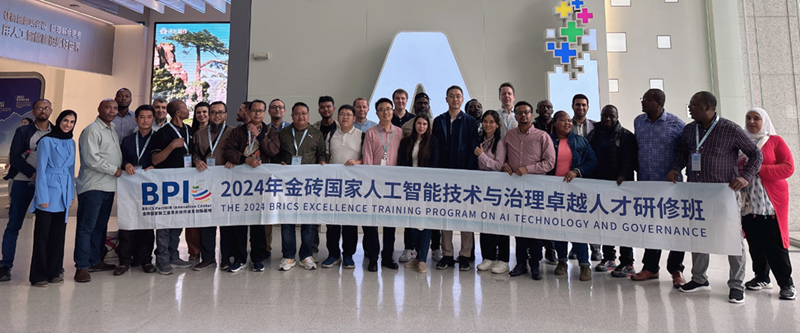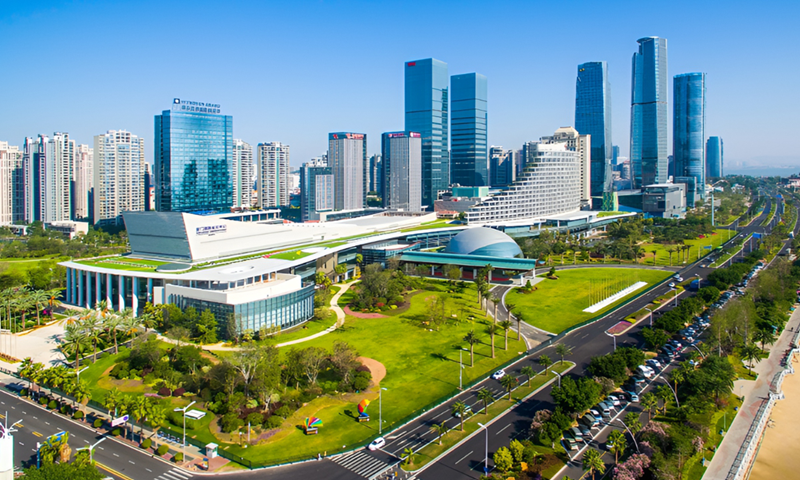
The BRICS AI Technology and Governance Elite Training Program hosted by the BRICS PartNIR Innovation Center (BPIC) has attracted 30 participants from 16 countries. Photo: Courtesy of BPIC
China will establish a China-BRICS research center on new quality productive forces, and a scholarship established for BRICS countries to facilitate talent cultivation in sectors including industry and telecommunication, it was announced at the 17th BRICS Summit on Sunday.
Aiming to support and cultivate young talents from BRICS and Global South countries while promoting multilateral exchange and cooperation in new industrial sectors, the BRICS New Industry Golden Egret Excellence Scholarship is open for application from Tuesday (July 8) to July 25. The scholarship is being set by the BRICS PartNIR Innovation Center (BPIC), and further details will be made available on its official website.
BPIC is located in Xiamen, a coastal city in East China's Fujian province. It has taken shape across five major key zones: the China-BRICS Science and Innovation Incubation Park, the Xiamen BRICS Digital Block, the Xiamen Airport Comprehensive Bonded Zone, the BRICS Intelligent Manufacturing Base, and Xiamen Software Park Phase III.
Since its establishment in late 2020, BPIC has emerged as a flagship of China's forward looking, high quality global engagement. A total of 107 BRICS cooperation projects have been signed, with a combined investment of 50.6 billion yuan ($7.06 billion).
The Kazan Declaration of the 16th BRICS Summit commended BPIC for its efforts to organize key events such as the BRICS Forum on Partnership on New Industrial Revolution 2024, the BRICS Industrial Innovation Contest 2024 and the BRICS New Industrial Revolution Exhibition 2024. The declaration also acknowledged BPIC's training programs and encouraged broader participation.
Since its launch, BPIC has held more than 90 sessions of BRICS talent training programs both online and offline, reaching over 3 million participants from more than 100 countries. BPIC also introduced a dedicated scholarship for nurturing global talent. The SUSONG Cup Future Industrial Technology Innovation Competition - BRICS Track, for instance, has been a great platform for encouraging startups and researchers to contribute cutting-edge solutions across emerging industries.
In parallel, it has worked to deepen policy coordination through joint research, standard alignment, and international cooperation. Key initiatives include joining the Global South Think Tanks Alliance, with which it launched 33 research projects. These projects, ranging from industrial internet to AI governance, have cultivated a new generation of innovators. All these efforts have succeeded in promoting mutual recognition of standards.
In terms of institutional innovation, the BRICS Service Zone within the Xiamen International Trade Single Window is the first public service platform in China dedicated to trade and economic cooperation with BRICS countries. The centralized digital platform streamlines trade-related administrative procedures by integrating services from various government departments.

The BRICS PartNIR Innovation Center in Xiamen, East China's Fujian province Photo: Huang Rong
In March, the Xiamen Special Economic Zone Regulation on the BRICS PartNIR Innovation Center took effect, elevating BPIC to a statutory institution. The newly expanded Strategic Advisory Committee, featuring domestic and foreign experts, is currently preparing the 2025 Innovation Development Report to steer future growth.
Xiamen is also becoming a logistics hub for BRICS nations: A cross-border air cargo route linking Xiamen and São Paulo has delivered over 10 million parcels, while the maritime shipping line between Xiamen and South Africa's coastal city of Durban has handled over 1.11 million containers. In 2024, Xiamen's total trade with BRICS countries reached 105.26 billion yuan.
On the people-to-people exchanges front, in May 2023, Xiamen established a sister relationship with Fortaleza, the state capital of Ceara in northeastern Brazil. The sister cities are known as the BRICS Twin Cities because both have hosted BRICS summits.
Meanwhile, Xiamen also forged sister-city ties with Durban, and strengthened exchanges with Kazan in Russia. It has built partnerships with over 20 BRICS government agencies, universities, and industry associations, and recently welcomed high-level delegations from countries including the UAE and Brazil to explore trade and investment opportunities.
Looking ahead, BPIC will refine its operations, promote standards and talent exchanges, and accelerate industrial cooperation projects as it seeks to build stronger links across BRICS and the Global South to expand its international impact.

Copyright © General Office of Fujian Provincial People's Government
Website Identification Code 3500000049Registration Number: 15003084
All rights reserved. The content (including but not limited to text, photo, multimedia information, etc) published in this site belongs to fujian.gov.cn.
Without written authorization from fujian.gov.cn, such content shall not be republished or used in any form.